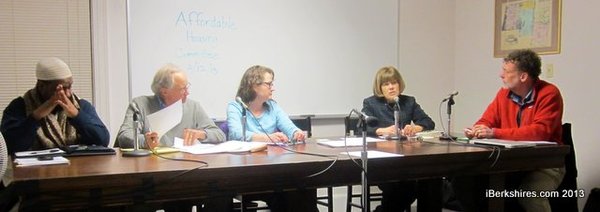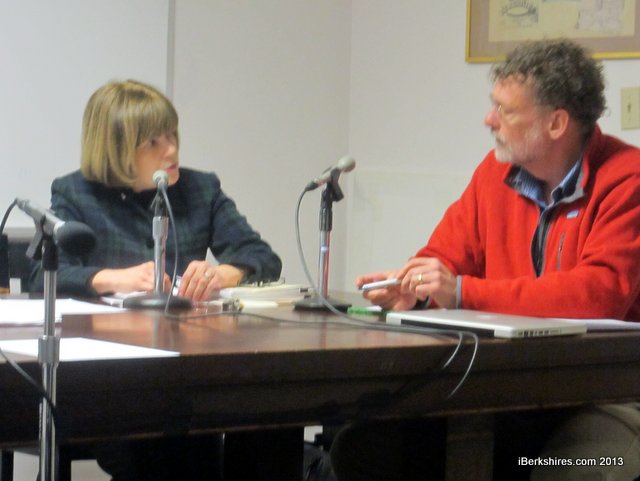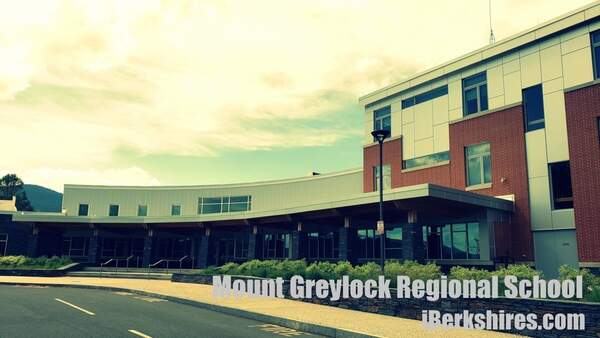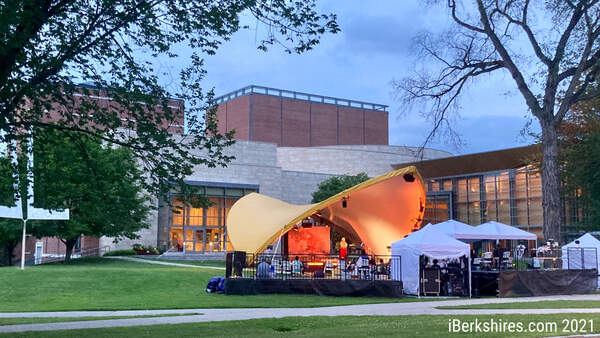
Williamstown Housing Committee Meets With Consultant

John Ryan of Development Cycles, right, filled the Affordable Housing Committee in on some of his preliminary housing findings. |
WILLIAMSTOWN, Mass. — A preliminary housing report for Williamstown shows rents and mortgages are taking a bigger bite out people's incomes but there are currently a number of more affordable homes available.
John Ryan of Development Cycles shared some of his numbers with the Affordable Housing Committee on Tuesday and heard its suggestions for questions it wants addressed in his final report, due this spring. The committee and Affordable Housing Trust are sharing the cost of the survey.
A couple of statistics he pointed to based on raw numbers show that the town has a shortage of units that meet the federal Department of Housing and Urban Development's definition of "affordable."
For example, Ryan said his research shows the median monthly rental for a one-bedroom apartment is $835. For that to be "affordable," as the term is used by HUD, a renter would have to earn $33,400 per year in gross income to afford spending 30 percent of his or her income on rent.
"If you look at the income of current renters, only half could rent that [median-priced unit] affordably," he said.
He said he has seen a dramatic increase in the number of renters in town who are paying more than 35 percent of their income for housing and a "troubling" increase in the number of homeowners who are paying more than 35 percent of their income on housing.
The latter trend could point toward even more need in the immediate future for rental property.
He did report some positive findings on the local housing scene. Part of his investigation included a look at the condition of homes at different price points, and he reported that based on his conversation with the town assessor, there is a "fairly large number of homes" in average condition that are valued less than $150,000.
In terms of hard data, much of Ryan's research is derived from figures in the decennial Census and the the American Community Survey, a relatively new demographic tool developed by the Census Bureau that uses statistical modeling to project from a smaller sample collected annually.
The most recent Census Bureau figures do not take into account the 155 homes lost at the Spruces Mobile Home Park as a result of Tropical Storm Irene. Ryan said his final report will reflect how conditions in town have changed post-Irene.
"I think it is a reasonable approach to say the Spruces represented de facto affordable housing ... and if the town wants to redress that imbalance, we can provide a picture of who [those former residents] are," he said.
The committee pressed Ryan to address the full range of housing needs in his final report — taking into account senior citizens, residents with disabilities and working families.
"When I look at need, I focus on who is living in Williamstown already," Ryan said. "Williamstown is a large employer. To what extent do jobs create a need for housing that is not addressed here?
"[Williamstown] isn't an island. People can go seven miles away and find more affordable housing, but people want to live in Williamstown."
Ryan promised the committee members a draft of his report by the end of March. After they make comments and he makes final revisions, the committee will receive the final report at an April 16 meeting.
In other business, the committee approved unanimously a request from Scarafoni Associates to raise the rents at the Church Corner apartment complex by an average of $38 per unit, pro-rated by unit size across the facility's eight apartments.
David Scarafoni told the committee that the rent increase was necessitated by an increase in property taxes on the site because of a reassessment.
Originally, he said, the town had nearly doubled the property's assessment, an increase that would have translated to a hike of $67 per month per unit. But after notifying the tenants of a potential increase at that level, his company (which manages the property for the non-profit Church Corner LLC), successfully negotiated a tax abatement with the town.
According to the regulatory agreement governing the property, any changes in the rent must be approved by the town, and the AHC was charged with granting that approval.
The committee discussed delaying a decision until after it had a chance to seek input from the complex's residents but ultimately decided that since rents after the hike continue to be well below the 30 percent of the income level of the population the apartments are intended to serve, the request was reasonable. It passed unanimously.
The committee also voted unanimously to approve a an expenditure of about $9,000 to cover the costs of soil remediation at the site of the former town garage. The Water Street property long has been eyed by the committee as a potential site on which to develop new affordable housing.
Tags: affordable housing, census, housing report,















